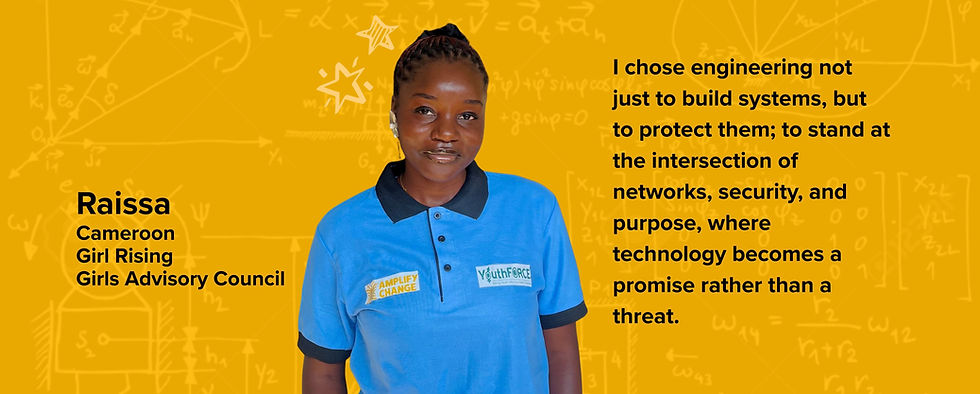Why Your Girl Squad Is the Best Hack for Health, Happiness, and Equity
- Jul 30, 2025
- 4 min read
By Divya Joseph, Associate Director of Communications & Community Engagement at Girl Rising

“Hey, I know this has to be the hundredth time that I’m going to go over the same problem with you, but… can you talk me through it one more time?” I asked, already feeling sheepish.
“Sure, I have some time!” came the reply, chirped with the kind of unflinching enthusiasm that only a true friend can muster.
Bethany, with her spunky tone and bottomless reserves of patience, never made me feel like a burden, even when I felt like one. She’s been an anchor through job changes, romantic conundrums, and the aching grief of losing a parent.
There’s something uniquely powerful in female friendships. And as it turns out, science agrees.
It’s Not Just in Your Head—It’s in Your Heart (Literally)
When stress hits, women often look for meaningful connections with others more often than men, a reflex that is cited to release oxytocin, the so-called “love hormone.” Researchers at UCLA call it the “tend-and-befriend” response. This process softens the stress response and lowers cortisol levels, essentially acting as a built-in emotional regulator.
But the benefits don’t stop at emotional regulation. A meta-analysis of 148 studies found that people with strong social relationships have a 50% higher chance of survival than those without. That’s as beneficial for your health as quitting smoking or becoming more active!
Another study from Monash University showed that women with three or more close friends had a 30% lower risk of heart disease. Isolation, on the other hand, is as dangerous as obesity or a sedentary lifestyle. So, go ahead and talk to your friends like your life depends on it, because it does!
Female Friendships Forge Equality
However, female friendships aren’t just about mutual support. Together, we level the playing field. A landmark study of MBA alumni (PNAS) shows top-performing women had not only broad networks but also a tight inner circle of well-connected women who shared gender-specific insights, such as which companies truly support women, what to ask for in salary negotiations, and how to push through structural bias.
That tight-knit circle of mentors, confidantes, and sponsors make all the difference in navigating male‑dominated spaces. At the NIH, women with senior-level women sponsors were 26 % more likely to be promoted within a year across 118 organizations and 30,000 employees. And in tech industries, women backed by mentors and sponsors are:
20 % more likely to be promoted,
40 % less likely to leave,
And 59 % of C‑suite women report having one or more female mentors.
The value of female friendships doesn’t wait until adulthood to kick in; it begins in girlhood. Research shows that girls with supportive friendships are more likely to thrive academically and socially. For instance, a study found that adolescent girls with close friendships had higher levels of school engagement and achievement. Another study highlights how positive peer relationships in middle school predict better academic outcomes and even lower dropout rates.
Those early bonds not only help girls weather the challenges of adolescence but also equip them with valuable life skills like resilience and confidence that carry forward into higher education and careers. It’s a powerful reminder that when girls learn to support one another, they set the stage for collective success as women.
The First Thing We Sacrifice
Yet for many women, friendship is the first thing to go when prioritizing life’s many responsibilities. Our culture tells especially women, who are mothers, caretakers, and professionals, to tighten up, endure, and hold it all together for the greater good of the family, the workplace, even the world.
So we keep our calendars full of caregiving responsibilities, school drop-offs, client meetings and even volunteering duties long before we prioritize ourselves and our friendships. And we tell ourselves there isn’t time for that coffee catch-up call because it’s indulgent.
But if isolation is killing our hearts faster than obesity or inactivity, isn’t that shelving ourselves? In fact, prioritizing ourselves and our friendships could pay dividends by recharging us in ways that help us show up with more energy, purpose, and care for our families, workplaces, and the world.
It is time to change the culture of women and girls feeling guilty for that gab session! So, say it with me: Friendship isn’t frivolous. It isn’t a luxury. It’s a vital, preventive self-care and a catalyst for growth and equity.
Reclaiming the Circle
I think often about how my friendship with Bethany has saved me, not just from bad decisions, despair and boredom, but from myself. She reminds me to rest. She reminds me to laugh, forgive myself, and to dream bigger. She reminds me that I am still human beneath the armor of my roles.
If you’re reading this and thinking of the girlfriend you haven’t texted back, consider this your sign. Send the text. Make the call. Plan the walk. It doesn’t have to be perfect. It just has to happen.
Friendship isn’t just about showing up for others. It’s about showing up for yourself—for your health, your power, your equity, and the vibrant, beautiful life you deserve. Choose you!




Comments